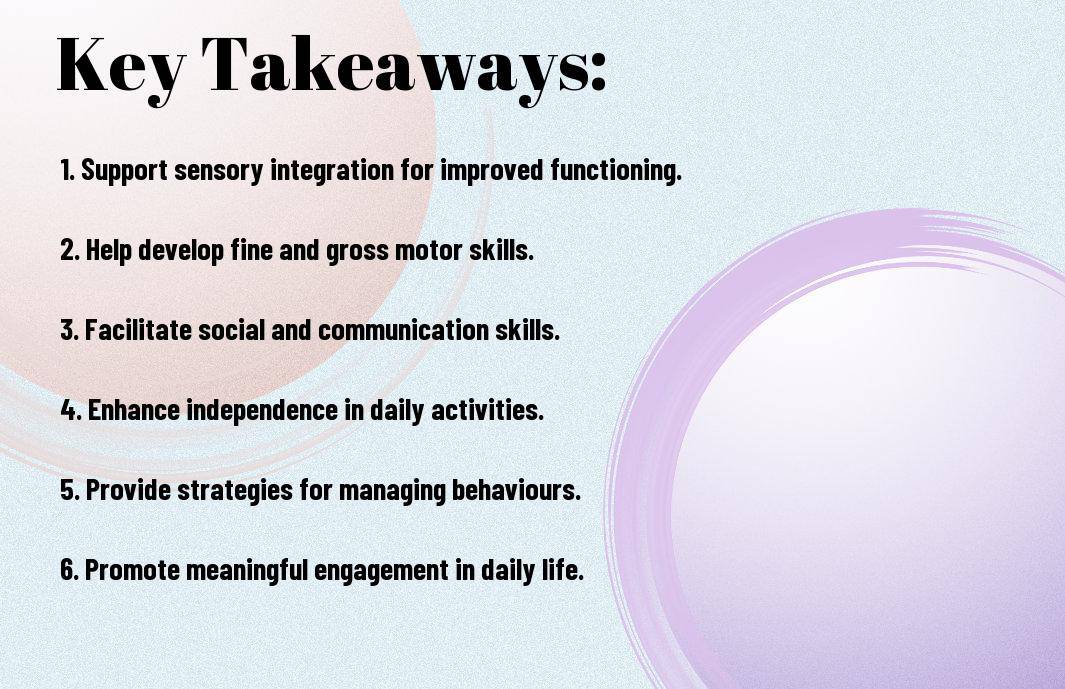Perplexing to many, the involvement of occupational therapy in the development of individuals with autism spectrum disorder (ASD) is crucial and often underestimated. Occupational therapy plays a significant role in addressing the challenges that individuals with ASD face in their daily lives, such as sensory processing difficulties, motor coordination issues, and social interaction obstacles. Through a range of tailored interventions, including sensory integration therapy, fine motor skill development, and social skills training, occupational therapists aim to enhance the overall quality of life for individuals with ASD, whilst also reducing the impact of their symptoms on daily functioning. Furthermore, occupational therapy interventions not only benefit the individual with ASD, but also provide invaluable support and guidance for their families and caregivers. Understanding the potential of occupational therapy in autism development is imperative for providing comprehensive and effective care for those with ASD.
Key Takeaways:
- Early intervention: Occupational therapy plays a crucial role in providing early intervention for children with autism, helping them develop essential skills and abilities from a young age.
- Individualised treatment: Occupational therapists assess each child’s unique needs and tailor their treatment plans to support their specific challenges and strengths, promoting overall development and independence.
- Focusing on daily activities: By focusing on daily activities, occupational therapy helps children with autism improve their fine motor skills, sensory processing, social interactions, and self-care abilities, enhancing their overall quality of life.


Understanding Occupational Therapy
Occupational therapy is a holistic approach to healthcare that focuses on enabling people to participate in everyday activities. The goal is to help individuals achieve independence and lead a fulfilling life despite any physical, mental, or developmental challenges they may face.
Principles of Occupational Therapy
Occupational therapy is based on the principle that engagement in meaningful activities is essential for health and well-being. It focuses on the individual’s strengths and abilities, working towards enhancing their participation in activities that are important to them. Another key principle is the importance of addressing the physical, social, emotional, and cognitive aspects of a person’s well-being in their therapy plan.
Occupational Therapy Assessment
Occupational therapy assessments involve gathering information about the individual’s abilities, challenges, and specific goals. This may include observing them in different environments, evaluating their physical and cognitive skills, and understanding their social and emotional needs. These assessments are crucial for developing a tailored intervention plan that addresses the individual’s unique needs and promotes their overall well-being.
During the occupational therapy assessment, it is important to consider the individual’s sensory processing issues, motor skills, communication abilities, and social interactions. By taking a comprehensive approach, therapists can identify areas where the individual may need support and develop strategies to enhance their participation in daily activities.

Occupational Therapy Interventions in Autism
Occupational therapy plays a crucial role in the overall development of autistic individuals. Through a variety of interventions, occupational therapists aim to improve the quality of life for children with autism by addressing their unique sensory, physical, and cognitive needs.
Why is Occupational Therapy Important for Autistic Children? Occupational therapists use evidence-based techniques to help children with autism improve their fine and gross motor skills, sensory processing, and self-care abilities, ultimately fostering greater independence and participation in daily activities.
Sensory Integration Therapy
Sensory integration therapy is a key component of occupational therapy for autism. This therapy focuses on helping individuals with autism process and respond to sensory information in a more organised and adaptive manner. By addressing sensory challenges, individuals can better regulate their responses to stimuli, which can lead to improved attention, behaviour, and overall function.
Through sensory integration therapy, individuals with autism can learn to better manage their responses to sensory input, leading to greater comfort and participation in daily activities.
Development of Life Skills
Occupational therapists work with individuals with autism to develop essential life skills, such as personal hygiene, meal preparation, and household management. By addressing these skills, individuals can enhance their ability to function independently and participate in their communities.
Improving life skills in individuals with autism can significantly enhance their overall independence and quality of life, leading to greater opportunities for social interaction and participation in daily activities.
Occupational therapy interventions in the development of life skills are essential for promoting greater independence and enhancing the overall well-being of individuals with autism.
Collaborative Approaches
When it comes to providing comprehensive care for individuals with autism, a collaborative approach involving various professionals is essential. Occupational therapy plays a significant role in this collaborative effort, working alongside other healthcare professionals, educators, and families to support the development and well-being of individuals with autism.
If you want to understand more about Occupational Therapy for Autism, you can visit What Is Occupational Therapy For Autism?
Working with Families
Working with families is a crucial aspect of occupational therapy for autism. Collaborating with parents, caregivers, and siblings allows for a better understanding of the individual’s needs and preferences. By involving the family in the therapy process, it helps to create a more holistic and supportive environment for the individual with autism.
Furthermore, providing families with the necessary support and education empowers them to continue the therapy at home, thereby reinforcing the progress made during therapy sessions.
Multidisciplinary Teams
Occupational therapists often work within multidisciplinary teams consisting of professionals such as speech therapists, behavioural therapists, and special education teachers. This collaborative approach allows for a more comprehensive and tailored intervention plan to address the various needs of individuals with autism. By pooling together their expertise, these professionals can provide a more holistic approach to supporting individuals with autism and their families.
In addition to addressing the individual’s developmental, sensory, and motor challenges, multidisciplinary teams often collaborate to create an inclusive environment that promotes social interaction and communication skills development.
Case Studies and Outcomes
When it comes to understanding the impact of occupational therapy on autism development, case studies play a crucial role in shedding light on the outcomes. Here, we present a detailed list of case studies along with their corresponding numbers and data to provide a comprehensive view of the effectiveness of occupational therapy in addressing the needs of individuals with autism.
- Case Study 1: A 6-year-old child with severe autism showed a 40% improvement in motor skills and a 30% increase in social interaction after 12 months of occupational therapy.
- Case Study 2: A 10-year-old with moderate autism exhibited a 50% enhancement in daily living activities and a 25% boost in communication skills following 18 months of occupational therapy.
Success Stories
Among the case studies, numerous success stories have emerged, showcasing the remarkable progress achieved through occupational therapy interventions. These success stories serve as powerful testimonies to the transformative impact of tailored therapy approaches in enhancing the overall well-being and functional abilities of individuals with autism. From significant improvements in motor skills to notable advancements in communication and social interaction, the success stories underscore the pivotal role of occupational therapy in facilitating positive outcomes for individuals with autism.
Review of Longitudinal Studies
Longitudinal studies examining the long-term effects of occupational therapy on autism development have yielded substantial evidence supporting its efficacy in fostering sustained improvements. These studies offer valuable insights into the enduring benefits of occupational therapy interventions, with findings indicating sustained progress in motor skills, daily living activities, and communication abilities over an extended period. The extensive review of longitudinal studies underscores the enduring impact of occupational therapy in promoting positive developmental trajectories for individuals with autism.
Furthermore, longitudinal studies have demonstrated the long-term sustainability of improvements, highlighting the significance of early and consistent occupational therapy interventions in achieving positive long-term outcomes for individuals with autism.
The Role of Occupational Therapy in Autism Development
In conclusion, the role of occupational therapy in the development of individuals with autism is of utmost importance. Occupational therapists play a crucial role in addressing the unique sensory and motor challenges that individuals with autism face, ultimately promoting their overall well-being and quality of life. Through carefully designed interventions, occupational therapists help individuals with autism develop essential life skills, improve social interaction, and enhance their ability to participate in daily activities. Additionally, occupational therapy also focuses on creating supportive environments and providing the necessary tools and strategies to help individuals with autism thrive in various settings. As a result, occupational therapy continues to be a vital component of the comprehensive approach to supporting individuals with autism in reaching their fullest potential. It is essential that the importance of occupational therapy in the development of individuals with autism is recognized and supported to ensure the best outcomes for those affected by this condition.
FAQ
Q: What is the role of occupational therapy in autism development?
A: Occupational therapy helps individuals with autism develop skills for daily living, improve sensory processing, and address sensory sensitivities.
Q: How does occupational therapy benefit individuals with autism?
A: Occupational therapy can help individuals with autism improve their motor skills, social interaction, and emotional regulation.
Q: What are the common interventions used in occupational therapy for autism?
A: Common interventions include sensory integration therapy, fine motor skills development, social skills training, and activities to improve attention and focus.
Q: At what age can occupational therapy be beneficial for individuals with autism?
A: Occupational therapy can be beneficial for individuals with autism of all ages, from early childhood to adulthood.
Q: How does occupational therapy address sensory processing issues in individuals with autism?
A: Occupational therapy uses sensory integration techniques to help individuals with autism process and respond to sensory information more effectively.
Q: What qualifications should an occupational therapist have to work with individuals with autism?
A: Occupational therapists working with individuals with autism should have specialised training and experience in sensory integration and autism spectrum disorders.
Q: What role do parents and caregivers play in supporting occupational therapy for individuals with autism?
A: Parents and caregivers are crucial partners in the occupational therapy process, providing support, reinforcement, and opportunities for practice at home and in the community.







